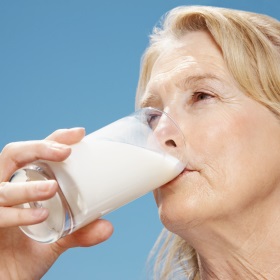 Loss of bladder control, or urinary incontinence, is a problem that millions of women face. The involuntary loss of urine can range in presentation; it can be minimal, from a few drops when you laugh, exercise, or cough. Or, it can be an accident when you suddenly urge to urinate and can't keep it in. Most episodes of urinary incontinence are the result of altered pressures or stress on the muscles and nerves that help you pass or hold urine in. Hormone changes can also affect muscle strength. Like your vaginal tissue, the muscle tissue in and surrounding the bladder and urethra (the short tube that passes urine from the bladder out the body) requires estrogen to remain supple and strong. When estrogen levels drop in menopause, the tissue around the bladder and urethra thin and weaken,which can lead to incontinence.
Loss of bladder control, or urinary incontinence, is a problem that millions of women face. The involuntary loss of urine can range in presentation; it can be minimal, from a few drops when you laugh, exercise, or cough. Or, it can be an accident when you suddenly urge to urinate and can't keep it in. Most episodes of urinary incontinence are the result of altered pressures or stress on the muscles and nerves that help you pass or hold urine in. Hormone changes can also affect muscle strength. Like your vaginal tissue, the muscle tissue in and surrounding the bladder and urethra (the short tube that passes urine from the bladder out the body) requires estrogen to remain supple and strong. When estrogen levels drop in menopause, the tissue around the bladder and urethra thin and weaken,which can lead to incontinence.
The most common types of urinary incontinence include stress incontinence and urge incontinence. Stress incontinence occurs when the pressures from activities such as laughing, coughing, and sneezing cause leakage. Urge incontinence occurs when you have the urge to urinate and your bladder squeezes at the wrong time. Often, these two types can create a mixed picture. Other bladder problems that can happen are nocturia, when you must wake up multiple times throughout the night to urinate, and dysuria, painful urination.
If you think you have incontinence, visit a professional to learn more about the variety of options you have for treatment. A professional can be your primary care physician, gynecologist, urologist, and even a urogynecologist. Your physician may recommend lifestyle changes such as limiting alcohol or caffeine intake, recording a voiding diary, or strengthening your pelvic floor muscles with Kegel exercises. Beyond this, therapies also include devices inserted into the vagina to hold up the bladder (pessaries), a variety of medications, and surgery if necessary. Your physician will also be the one to exclude other potential causes of bladder problems including infection and neurological damage.
To learn more about urinary issues or other symptomatology that arise during menopause, visit Northwestern's menopause website here.

 Drinking milk is not just for kids but also for post-menopausal women, new research shows. A new study from the Women's Health Initiative just published by the North American Menopause Society, reveals that calcium and vitamin D after menopause can improve women's cholesterol profiles.
Drinking milk is not just for kids but also for post-menopausal women, new research shows. A new study from the Women's Health Initiative just published by the North American Menopause Society, reveals that calcium and vitamin D after menopause can improve women's cholesterol profiles. New research proves yet another reason for women to quit smoking: smoking may cause earlier signs of menopause. Heavier smokers may enter menopause up to nine years earlier compared to nonsmokers.
New research proves yet another reason for women to quit smoking: smoking may cause earlier signs of menopause. Heavier smokers may enter menopause up to nine years earlier compared to nonsmokers. Vulvovaginal atrophy (VVA) or atrophic vaginitis is a medical challenge because it is under-reported by women, under-recognized by health-care providers and, therefore, under-treated according to a new study out of Italy. More or less 50% of postmenopausal women experience vaginal discomfort attributable to VVA. Surveys suggest health-care providers should be proactive in order to help their patients to disclose the symptoms related to VVA and to seek adequate treatment when vaginal discomfort is clinically relevant. Women are poorly aware that VVA is a chronic condition with a significant impact on sexual health and quality of life and that effective and safe treatments may be available. Indeed, female sexual dysfunction and genitourinary conditions are more prevalent in women with VVA. That being so, it is very important to include VVA in the menopause agenda, by encouraging an open and sensible conversation on the topic of intimacy and performing a gynecological pelvic examination, if indicated. According to very recent guidelines for the appropriate management of VVA in clinical practice, it is essential to overcome the vaginal ‘taboo’ in order to optimize elderly women's health care. To learn more about menopause, visit menopause.northwestern.edu or read the full article :
Vulvovaginal atrophy (VVA) or atrophic vaginitis is a medical challenge because it is under-reported by women, under-recognized by health-care providers and, therefore, under-treated according to a new study out of Italy. More or less 50% of postmenopausal women experience vaginal discomfort attributable to VVA. Surveys suggest health-care providers should be proactive in order to help their patients to disclose the symptoms related to VVA and to seek adequate treatment when vaginal discomfort is clinically relevant. Women are poorly aware that VVA is a chronic condition with a significant impact on sexual health and quality of life and that effective and safe treatments may be available. Indeed, female sexual dysfunction and genitourinary conditions are more prevalent in women with VVA. That being so, it is very important to include VVA in the menopause agenda, by encouraging an open and sensible conversation on the topic of intimacy and performing a gynecological pelvic examination, if indicated. According to very recent guidelines for the appropriate management of VVA in clinical practice, it is essential to overcome the vaginal ‘taboo’ in order to optimize elderly women's health care. To learn more about menopause, visit menopause.northwestern.edu or read the full article :  New long-term research shows that hot flashes continue, on average, for five years after menopause. More than a third of women can experience hot flashes for up to ten or more years after menopause.
New long-term research shows that hot flashes continue, on average, for five years after menopause. More than a third of women can experience hot flashes for up to ten or more years after menopause. Do hormone levels in postmenopausal women affect cognitive function? New research sheds light on the postmenopausal brain.
Do hormone levels in postmenopausal women affect cognitive function? New research sheds light on the postmenopausal brain. New research shows that women with high blood pressure during pregnancy may be at higher risk of having troublesome menopausal symptoms in the future. A research study from the Netherlands examined the relationship between hypertensive diseases and hot flashes and night sweats.
New research shows that women with high blood pressure during pregnancy may be at higher risk of having troublesome menopausal symptoms in the future. A research study from the Netherlands examined the relationship between hypertensive diseases and hot flashes and night sweats. Women undergoing menopause experience symptoms including hot flashes, sleeplessness, depression, joint pain, and poor concentration, to name a few. Hormone therapy has proven to improve some of these symptoms in menopausal women, but new research shows that treatment may only improve quality of life in those who undergo a significant number of hot flashes.
Women undergoing menopause experience symptoms including hot flashes, sleeplessness, depression, joint pain, and poor concentration, to name a few. Hormone therapy has proven to improve some of these symptoms in menopausal women, but new research shows that treatment may only improve quality of life in those who undergo a significant number of hot flashes. Hot flashes: most menopausal women have them, and all menopausal women hate them. For one in ten women, hot flashes occur for five years or longer, signicantly affecting multiple aspects of their lives including relationships and sleep. While hormone replacement therapy has largely addressed the issue of hot flashes in many women, other women have sough alternatives. Alternatives including yoga, acupuncture, exercise, and applied relaxation have all been helpful in women undergoing menopause.
Hot flashes: most menopausal women have them, and all menopausal women hate them. For one in ten women, hot flashes occur for five years or longer, signicantly affecting multiple aspects of their lives including relationships and sleep. While hormone replacement therapy has largely addressed the issue of hot flashes in many women, other women have sough alternatives. Alternatives including yoga, acupuncture, exercise, and applied relaxation have all been helpful in women undergoing menopause.